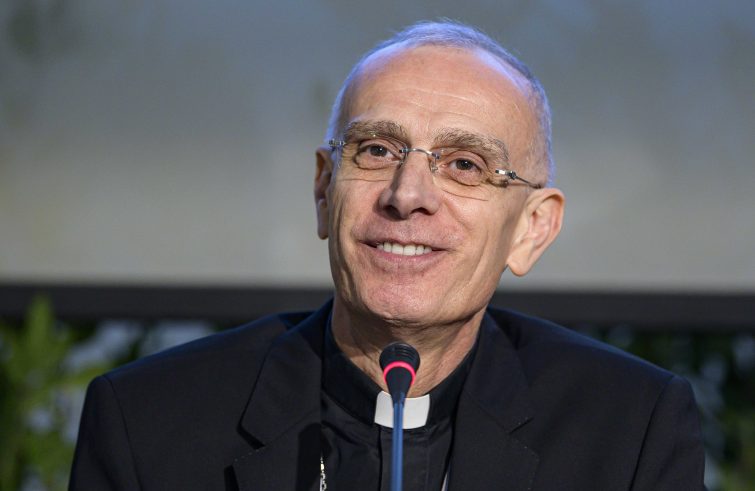
“The inspiration of Cardinal Bassetti, drawing on the legacy of Giorgio La Pira, and given major impetus by the Pope, is extending beyond national borders”, Monsignor Antonino Raspanti, vice-president of the Italian Bishops’ Conference told SIR illustrating the details of the meeting of bishops and mayors of the Mediterranean region, to be held next February 23-27. A joint statement of intent signed by the bishops and mayors of the Mediterranean region and the creation of a Mediterranean Youth Council are among the practical goals of the meeting.
The meeting in Florence is less than a month away: are preparations well advanced? And how many bishops are expected to attend?
As far as the meeting of the bishops is concerned, everything is in place in terms of content: topics, subdivision of themes, programmes, and the timeframe for discussion and confirmed participants, subject to slight variations due to the ongoing health crisis. For example, we have invited all the Italian bishops for Saturday and Sunday. Approximately 70 bishops have accepted our invitation so far, slightly fewer than the event in Bari, since two years ago the epidemic was still in its early stages and its scope was yet unknown. There are almost 60 delegates, with one or two representatives from each ecclesiastical circumscription, depending on their size, including some lay experts from foreign Bishops’ Conferences. To these must be added the 30 or so members of the Scientific Committee. Thus about 90 people will take part in the conferences in Florence each day, before the concluding two days when the audience will be extended in view of the arrival of the Holy Father.
Pope Francis will be attending for the second time this conference on the Mediterranean promoted by the Italian Church, a sea which “forces surrounding peoples and cultures to constant interact”, as Francis said in Bari. What kind of responsibility does this entail for the Churches overlooking the shores of the ‘Mare Nostrum’?
As was the case of the Bari meeting, the goal remains that of fostering our common connection with the great Mediterranean region. In fact, to date we have had the European Bishops’ Conferences, the Conference of African Churches and the Conference of Eastern Churches, but there is not yet a shared awareness of our common connection with the Mediterranean Churches, due to rifts and sharply defined borders.
Fostering the awareness of what we have in common, that is, a new ecclesial entity, is not something that can be achieved in two meetings: it takes time. In the meantime, other Bishops’ Conferences – such as the French one – have expressed an interest in meetings similar to those organised by the Italian Bishops’ Conference. The idea of a circular approach is starting to take shape. The inspiration of Cardinal Bassetti, drawing on the legacy of Giorgio La Pira, and given major impetus by the Pope, is extending beyond national borders.
All this intersects and perfectly complements the synodal sensitivity that Francis calls on the Church to embrace, not only as a way of proceeding and working, but also in its ecclesiological and theological understanding. It is the idea of the “people of God” found in Lumen Gentium, which the Pope hopes will be reflected in a consolidated synodal practice. The fact that the sister Churches will gather for consultation and dialogue on common issues in Florence, with internal and external collaboration and support, is a step in that direction.
Upon returning from Lesbos five years after his first apostolic journey, Pope Francis once again referred to the Mediterranean as “a graveyard without tombstones”, calling for the “shipwreck of civilisation” to be averted. The meeting with the mayors is one of the novelties of the Florence event: could it provide an opportunity for a new alliance between the Church and politics, understood as a service to the common good?
It’s an attempt. We are grateful to the mayor Dario Nardella for having embraced this idea, pursuing it together with the city of Florence. The mayors will work together on Thursday and Friday, as will the bishops starting on Wednesday, while Saturday will be the day when the mayors and bishops will work in unison, before meeting again the following day in the presence of the Pope.
The mayors – 100 have been invited, but no final data on the number of confirmed participants are available yet – have accepted to discuss the same topics as the bishops, whose leitmotif is the relationship between Mediterranean cities and citizenship, from two different angles. Some common ground will be sought, perhaps by signing a Letter of Intent with simple but practical goals.
There is a determination to work in this direction, a sign that the city of Florence’s civil society, inspired by La Pira, is sensitive to these issues and cooperative. Intercultural dialogue must be part and parcel of everyday life: not only on the part of the Christian community but also by reflecting on the contribution the city can make and determining the recognition of mutual rights and duties required in a situation characterised by widespread pluralism, albeit involving a variety of situations and approaches across different cities.
Which achievements do you expect to see after Florence?
Hopefully we will share the responsibility of something we have in common, something simple and attainable together. In addition to the confirmation and a further thrust of the Caritas project, implemented in Bari with the association Rondine-Cittadella della Pace, one of the projects envisaged is
the creation of a Mediterranean Youth Council,
following in the footsteps of a number of institutions that have been actively working for youth and peace in Florence for decades.











